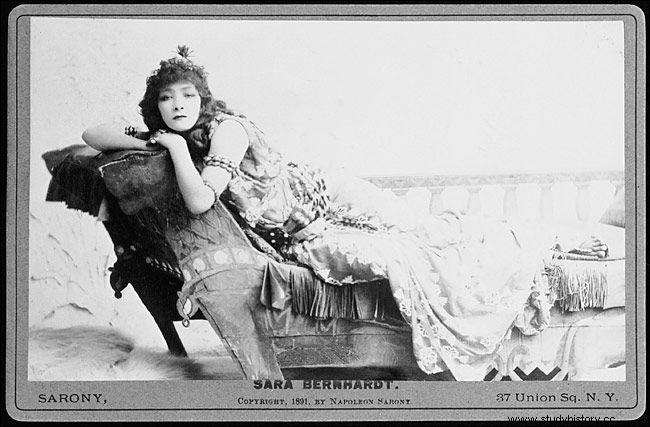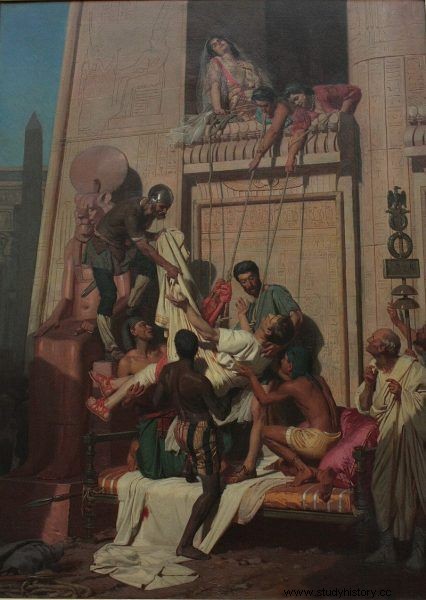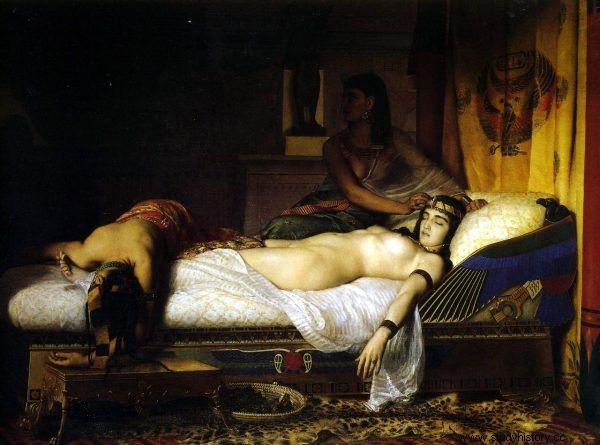In her life, she always strove for undivided power over Egypt. She made alliances, got rid of her opponents, and was not afraid to put everything on one card. The ancients wrote that she died as she lived - dramatically. What do we know about the last years of Cleopatra's life and death?
The conflict between Antony and Octavian grew, and so did the propaganda against Cleopatra. It culminated in 33 BCE, when the triumvirate was completed, and power in Rome on January 1, 32 BCE. the consuls took over. Officially, the empire broke up, and the blame for starting a civil war was placed on Cleopatra.

Still from the movie "Asterix and Obelix - Cleopatra's mission"
Antony's advisers suggested that Cleopatra should return to Egypt in order not to fuel Octavian's propaganda machine more, but the queen refused to leave for a number of reasons. She also certainly did not want to accept that her presence at the leader's side was not beneficial. On the one hand, she expected Antony to compromise with Octavian, and she was striving for total victory. On the other hand, she knew that she was competing with Octavian's sister and Antony's wife - Octavia, who was presented as a model of virtue and good .
The undefeated ruler
Cleopatra was surely aware of Mark Antony's weakness and his vulnerability to the influence of counselors. She was afraid that shortly after her departure he could reconcile with his wife and even turn against Egypt, and she could not afford to lose an ally. An additional argument for staying by the commander's side was the fact that Egypt was paying Antony's army and fleet.
The Queen has always wanted to emphasize that she is the only ruler of Egypt . This was manifested, among others, by relief in the temple of Hathor in Dendera, where she was shown with her son Caesarion. The relief suggests that they both exercise equal power over Egypt, but it was she - placed on the left side of the entire stage, was the most important. She was shown here as a beauty that Isis herself sent to earth as her regent . Cleopatra could not afford Antony to erase this image by sending her as his subordinate to Alexandria

Sarah Bernhardt as Cleopatra
The destructive power of jealousy
How much Cleopatra felt threatened by Octavia can be seen in her actions aimed at neutralizing the opponent at all costs. During her stay in Athens, the queen was so jealous that a special resolution was issued granting her various honors, and then Antony, along with other Athenians, delivered her home to the queen. Antony also sent a legation from Athens to inform Octavia about their divorce and kick her out of the house .
War was therefore inevitable. It is not known why, Mark Antony did not attack immediately, although he had a significant military advantage. However, he gave Octavian time to gather his strength and, more importantly, to retrieve Antony's testament from the Temple of Vesta. Properly presented, the document sparked outrage among the people of Rome. Antony wrote in it, inter alia, good for his children, recognized Caesarion as the son of Caesar, made political decisions. The worst from the citizens' point of view, however, was the wish to be buried in Alexandria with Cleopatra.
The record relating to Cleopatra was water for Octavian's propaganda machine . The Queen now personified every threat to Rome and the world. There were stories that she wanted to conquer Rome and move her capital to Alexandria. The story that Cassius Dio recounts has become legendary over time, that when Cleopatra wanted to emphasize that she was sure of something, she said that:
it is as certain as i will someday be judging in the roman capitol
Impossible end
According to Plutarch and Cassius Dio, all signs in heaven and earth foreshadowed the imminent defeat of Antony in the ongoing war. His statues suffered damage under strange circumstances, the statue of Antony in Albanum suddenly began to drip blood . Children playing in Rome split into two camps, "Caesarians" and "Antonians", and after two days of fighting, the "Antonians" lost. The failure was also heralded by the swallows that nested under the stern of Cleopatra's flagship "Antonias" and were then driven from their abode by other swallows and their chicks perished.
The settlement of the civil war took place on September 2, 31 BCE. under Actium. Cleopatra fled the battlefield, and Antony followed her. The abandonment of his army on the battlefield and the reputation of the queen once again fueled Octavian's propaganda machine. The conflict was portrayed as Rome's struggle against an alien threat, and Cleopatra's reputation as a "whore queen" only solidified in the minds of Roman citizens.
August 1, 30 B.C.E. Octavian entered Alexandria. About what happened after that, we learn from Plutarch and Cassius Dio. In short, these were events worthy of a melodrama. Cleopatra was to send a messenger to Antony informing him of his death, and the latter, after receiving it, took off his armor and ordered himself to be killed by a servant with the sonorous name of Eros. However, he was unable to do so and committed suicide.
Antony tried to commit suicide, but he did it so ineptly that he had to ask to be killed, but everyone present at the events fled . In time, he received the news that Cleopatra was alive after all and that he wanted to see him. So he was taken to the tomb, dragged on ropes to the room where the queen was, and there, in great despair, he died in her arms.

according to the ancients, the dying Antony was pulled on ropes to the mausoleum where Cleopatra was staying
Knowing perfectly well the approach of ancient historians to the events of Cleopatra and the Civil War, we can say with certainty that the only certain information from this story are the following facts:Marcus Antony received incorrect information about the death of the queen, was wounded with a sword, was carried to Cleopatra and died .
So what happened to Cleopatra? One might expect that, also driven by great emotions, she threw herself on the dagger and died together with her lover. However, Cleopatra was not so hasty and did not get carried away. Although she threatened to kill herself and burn all the goods she had accumulated in the tomb, she still made an attempt to save herself and her country. Plutarch describes her encounter with Octavian, but it did not go the way the Queen intended.
Drama starring a snake
According to ancient writers, Cleopatra ended her life as she had lived - dramatically. The stories talk about the bite of snakes, because how banal it would be to take your own life with a dagger or poison . Certainly driven by the defeat in the negotiations with Octavian and the vision of grace as a slave to his triumph in Rome, on August 12, 30 BCE. eventually she decided to commit suicide. Or was she forced into it too?
The death of Cleopatra is the subject of many considerations. On the one hand, the situation she found herself in was not favorable for her, but it can be assumed that, as a 39-year-old woman, she did not necessarily want to die. The story of her life also shows that she coped with defeats and always looked for a way that would allow her to stay on the throne of Egypt. However, due to her previous relationship with Caesar and Mark Antony, she was too dangerous to stay alive . We should also remember that she was the mother of Caesarion, whom she announced as her successor and future ruler of Egypt when the relief in Dendera was created.
According to many stories, Cleopatra and her two maidservants died from the bite of a viper, which could have been transported in a basket with figs. At that time, only two types of snakes lived in Egypt that posed a threat to human life. The viper that hits a person by surprise has a very toxic venom that destroys tissues, causes skin necrosis and bleeding. She is certainly a deadly creature, but dying from her bite would be extremely long and painful .
The other snake considered as Cleopatra's suicide tool is the cobra. This animal can throw out 300 mg of venom at a time, while the lethal dose for humans is only 10-15 mg. After its bite, death can occur within a few minutes, however it is not a snake that can be easily provoked into attack . Moreover, not every cobra bite causes the death of a person. Therefore, it is difficult to imagine that an obedient cobra could be picked up and forced to attack three people on commission.
It is also worth mentioning that even Plutarch himself admitted that he did not know how Cleopatra died - from a snake bite or from being pricked with a pin soaked in poison. Suetonius describing the events of 30 BCE mentions that Octavian forced Antony to commit suicide and had the poison sucked out of Cleopatra's body. However, the phrase she uses "because she was believed to have died from a viper bite" suggests that the truth could have been quite different.

"Death of Cleopatra"
Yet another version of the death of the queen can be inferred from Plutarch's account. It is possible that two of Cleopatra's companions, under the influence of Octavian's spies, concluded that Cleopatra was better off dying in Egypt than being part of a triumph in Rome. Perhaps they were convinced that instead of suffering and despair leading to an unworthy death, it was better to preserve the majesty and pride of the queen by administering her poison.
Cleopatra is still considered a controversial woman today. In a male-dominated world, she was not afraid to seize the power she saw as her calling. She was well aware of what had to be done to keep her and that in the royal family the only choice she had to make was whether she would take power or die.
The last years of Cleopatra's life emphasized her determination and strength in pursuing her goals. In the end, it turned out that the queen's last ally was unable to provide security, and even provided her with worries. Influenced Antony was certainly an extremely difficult figure to manage. However, his romance with the Queen of Egypt went down in history.
As a strong and self-confident woman, she easily became a propaganda tool of Octavian, who was very anxious to declare Cleopatra the enemy number one of Rome. Her features, in contrast to what the ancient world saw as the ideal of a woman, made it an easy task. Certainly, Octavian faced a huge dilemma at the very end of the events I describe. He could take Cleopatra to Rome and humiliate her in front of the crowd during her triumph, and on the other hand, the Queen as Caesarion's mother could still have powerful friends in Rome.
So when considering Cleopatra's sudden death, there is another possibility to consider. The queen could have been murdered on the orders of Octavian, who had already established himself as a skillful commander and strategist . Certainly, the death of the queen brought him greater benefits, who then, as the winner, he could describe as he wanted. The death of Cleopatra was on his hand at the moment, and if we look at the whole story of the suicide committed with the cobra - the sacred animal of the Egyptians, the symbol of Isis and the pharaonic power, we will see the symbolism of the whole event.
Cleopatra's death will never be definitively explained. The messages about her come from sources susceptible to Octavian's very strong propaganda influence. One thing is for sure - Cleopatra lived her life with a bang and on her own terms . And although it is hard to believe in her suicidal dramatic death, whoever created this story gave her the whole idea of her life - a woman who, in a world dominated by men, always got her way.
